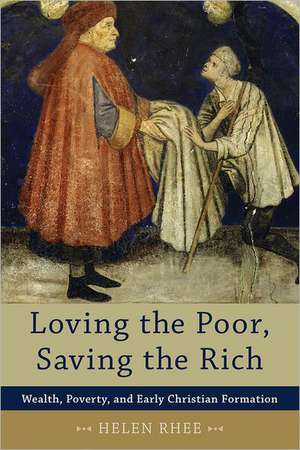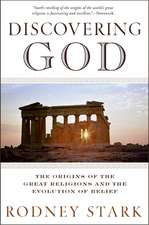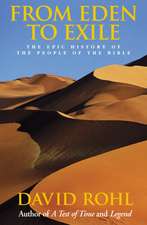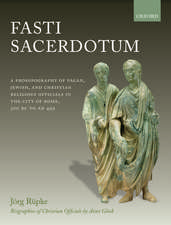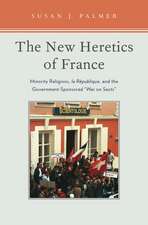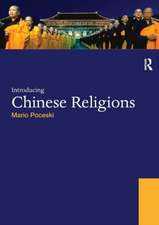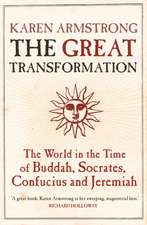Loving the Poor, Saving the Rich: Wealth, Poverty, and Early Christian Formation
Autor Helen Rheeen Limba Engleză Paperback – 30 noi 2012
Preț: 115.97 lei
Preț vechi: 167.71 lei
-31% Nou
Puncte Express: 174
Preț estimativ în valută:
22.19€ • 23.34$ • 18.34£
22.19€ • 23.34$ • 18.34£
Carte disponibilă
Livrare economică 27 martie-02 aprilie
Livrare express 30 noiembrie 27 - 06 martie 25 pentru 21.14 lei
Preluare comenzi: 021 569.72.76
Specificații
ISBN-13: 9780801048241
ISBN-10: 0801048249
Pagini: 279
Dimensiuni: 152 x 226 x 23 mm
Greutate: 0.41 kg
Editura: Baker Academic
ISBN-10: 0801048249
Pagini: 279
Dimensiuni: 152 x 226 x 23 mm
Greutate: 0.41 kg
Editura: Baker Academic
Textul de pe ultima copertă
"An excellent and deeply informed study of early Christian views of wealth and poverty. Rhee's analysis is especially sensitive to the social contexts of nascent Christian economic discourse. She presents a compelling and highly engaging analysis of the role that theologies and practices of wealth and poverty played in shaping the emergence of a distinctively Christian identity in the pre-Constantinian period. This book is essential reading for anyone interested in early and contemporary Christian understandings and practices of wealth and poverty. I commend it highly to scholars and students alike, and I will enthusiastically use it in my own research and teaching."
--David J. Downs, Fuller Theological Seminary "Helen Rhee's new book is the first in thirty years to provide an in-depth focus on responsible Christian giving in second- and third-century Greco-Roman church communities--and what that means for today. Historically sensitive and accurate, Loving the Poor, Saving the Rich is a welcome pastoral call to affirm the physicality of redemption and the grace of doing good."
--Susan R. Holman, author of God Knows There's Need: Christian Responses to Poverty
"The past ten years have witnessed a flurry of studies on wealth, poverty, and Christianity that have tended to focus on the New Testament and post-Constantinian periods. In Loving the Poor, Saving the Rich, Rhee produces what we have all been waiting for: a sensitive study that documents not just the 'what' but the 'why' of the important trajectory of a small and tentative Jesus movement within Greco-Roman society to an imperially endorsed and fiscally powerful church. This work sweeps beyond a mere historical study into the realms of inspiration. It is a sheer pleasure to read."
--Wendy Mayer, Centre for Early Christian Studies, Australian Catholic University "In contrast to our modern world's way of talking about issues of wealth and poverty, Rhee takes us back to a time when confronting wealth and addressing the concerns of poverty were identity-forming experiences for the Christian church. Rhee's conclusions yield some valuable reminders that the world of early Christianity invites the world of modern Christianity to live more simply. I think Rhee will be happy if even this is as far as most readers go after reading her delightful and informative book."
--Brian Matz, Carroll College
--David J. Downs, Fuller Theological Seminary "Helen Rhee's new book is the first in thirty years to provide an in-depth focus on responsible Christian giving in second- and third-century Greco-Roman church communities--and what that means for today. Historically sensitive and accurate, Loving the Poor, Saving the Rich is a welcome pastoral call to affirm the physicality of redemption and the grace of doing good."
--Susan R. Holman, author of God Knows There's Need: Christian Responses to Poverty
"The past ten years have witnessed a flurry of studies on wealth, poverty, and Christianity that have tended to focus on the New Testament and post-Constantinian periods. In Loving the Poor, Saving the Rich, Rhee produces what we have all been waiting for: a sensitive study that documents not just the 'what' but the 'why' of the important trajectory of a small and tentative Jesus movement within Greco-Roman society to an imperially endorsed and fiscally powerful church. This work sweeps beyond a mere historical study into the realms of inspiration. It is a sheer pleasure to read."
--Wendy Mayer, Centre for Early Christian Studies, Australian Catholic University "In contrast to our modern world's way of talking about issues of wealth and poverty, Rhee takes us back to a time when confronting wealth and addressing the concerns of poverty were identity-forming experiences for the Christian church. Rhee's conclusions yield some valuable reminders that the world of early Christianity invites the world of modern Christianity to live more simply. I think Rhee will be happy if even this is as far as most readers go after reading her delightful and informative book."
--Brian Matz, Carroll College
